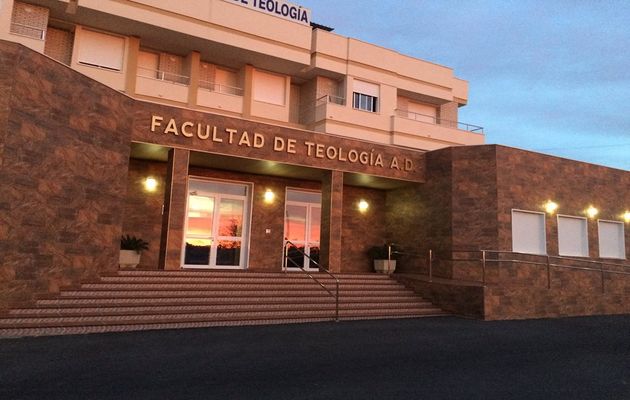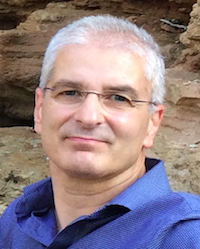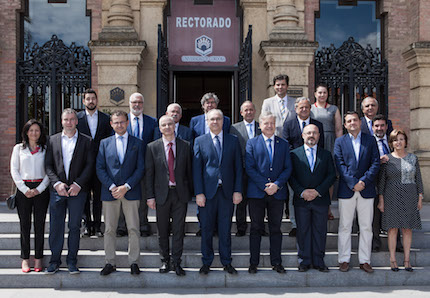Jesús Caramés, Rector of the Spanish Faculty of Theology of the Assemblies of God talks about the theological education in Spain.
 The Faculty of Theology of the Spanish Assemblies of God. . / Facebook of the Faculty.
The Faculty of Theology of the Spanish Assemblies of God. . / Facebook of the Faculty.
On June 1, the Faculty of Theology of the Spanish Assemblies of God celebrated its first 50 years of history.
Former students, some of the first class 1968-72, participated in an emotional tribute, which was attended by many local and regional political authorities.
The Rector of the Faculty, Jesús Caramés, expressed his gratitude for these years in an interview with the Spanish news website Protestante Digital, and talked about how the Faculty has grown and what he expects for the future.
Question. You have commemorated the 50th anniversary of the Seminary, now a Faculty, with a big event. What were your feelings that day?
Answer. It was a spectacular commemoration, in which we were able to have some representatives of the first class of graduates.
You can imagine how exciting it has been for everyone to see that journey of 50 years of history, how the students have remained faithful to their ministry.
Some of them are pastors, with a nationally recognised ministry. We are grateful to see that God has been glorified through all this.
 Jesús Caramés, Rector of the Faculty. / AD
Jesús Caramés, Rector of the Faculty. / ADQ. As a Faculty, are you in a moment of growth?
A. Yes, we are experiencing a spectacular growth. Like the church, seminaries are places protected by the Lord. They are spaces where those who will be responsible for building the church are trained, God protects those places.
We have seen a significant growth, not only regarding facilities, which have improved, but also regarding the commitment of the institution, the quality of the training, the excellence of the teachers.
The growth is seen in the ministerial development of our pastors: more pastors, better trained, that is the key element for a healthier church.
Q. Do you prioritise this ministerial approach in your training program?
A. Our project focuses on a practical theology. As the saying goes: "Preaching without theology is empty, and theology without preaching is blind". That is the balance, the parameter on which our institution is based.
In a broad sense, we want to train people prepared for pastoral ministry: chaplains, missionaries, teachers, people who are in the church as disciples and disciple makers.
We want that theology would bring us closer to Christ, to experience His Word and to know the almighty God who transforms us. We hope our example and teaching could contribute to see more lives being impacted.
Q. How many students are being trained in the Faculty?
A. In the face-to-face program we have had 77 students this year. We have an online program, with about 370 students, and we also have training in the churches, with about 350 more students.
In addition, we have a mission program which provides training in Equatorial Guinea, Sierra Leone, Israel and Sweden.
Q. In other Spanish faculties of Theology, the students are younger than before. Is that also happening in your Faculty?
A. Yes, in general the students are younger. We see it also when compared to other Assemblies of God seminaries in Europe.
For example, in the French seminary the average age exceeds thirty years, however in our centers, which have university recognition, students can access from high school, at 18 or 19.
We have a broad spectrum, very young students, but also people of other ages. This year the youngest was 18 years old and the oldest was 62.
 The teachers of the Faculty. / AD
The teachers of the Faculty. / AD
Q. Have the training of pastors improved in Spain?
A. I'm optimist. The seminaries are becoming very important for the church. For some time, the pastors of the evangelical churches had to be self-taught, especially in our context, and there are pastors who perhaps have not had the possibility of accessing to a formal education.
Right now it is easier for pastors to have a theological training, and that has its direct effect on healthier churches. There is still very much to do, but I think all the seminars are helping each other towards this goal.
Q. What are your dreams for the future?
A. We have dreams. The dream of all the teachers and the denomination is that this Faculty would be an effective tool for the training of ministers.
We want more people to be able to study. The Faculty is in continuous change, so that in the future we can have 200 students.
We depend on the grace of the Lord, to change the low percentages of evangelicals in Spain, so that more people would know Jesus, and be well trained to carry out this work. We hope that all evangelicals in Spain will see this Faculty as a tool to achieve that.

Las opiniones vertidas por nuestros colaboradores se realizan a nivel personal, pudiendo coincidir o no con la postura de la dirección de Protestante Digital.
Si quieres comentar o